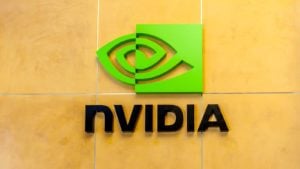Undervalued semiconductor stocks have declined sharply in 2022, pushing many stocks to 52-week lows. Supply-chain issues have yet to be ironed out and the 40-year high inflation has only added to suppliers’ woes.
Despite these challenges, the demand for semiconductors remains strong worldwide. Recent research highlights that the global semiconductor “market is projected to grow from $483.00 billion in 2022 to $893.10 billion by 2029, at a CAGR of 9.2% in forecast period.”
Presently, however, investor optimism for semiconductor stocks is still subdued. Accordingly, the PHLX Semiconductor Sector index has fallen around 24% year-to-date (YTD). In comparison, the S&P 500 index has only dropped 14%.
Despite recent challenges, the semiconductor sector is poised to gain significant ground in the future. An increasing number of industries, such as robotics, artificial intelligence (AI), electric vehicles (EVs) and household goods have started utilizing semiconductors in new and exciting ways.
With that information, here are five undervalued semiconductor stocks to buy in June:
| Ticker | Company | Price |
| MRVL | Marvell Technology, Inc. | $53.96 |
| MU | Micron Technology, Inc. | $67.27 |
| NVDA | Nvidia Corporation | $171.32 |
| TSM | Taiwan Semiconductor Manufacturing Company Limited | $88.71 |
| SMH | VanEck Semiconductor ETF | $225.01 |
Undervalued Semiconductor Stocks: Marvell Technology (MRVL)

- 52-week range: $50.41 – $93.85
Marvell Technology (NASDAQ:MRVL) designs and manufactures semiconductors for computing, networking and storage, as well as a range of customized solutions.
In late May, Marvell reported first quarter (Q1) fiscal-year 2023 (FY23) financials. Net revenue was $1.4 billion, representing a 74% increase year-over-year (YOY). Adjusted earnings per share (EPS) was 52 cents, up from 29 cents the year before. Cash flow from operations was $194.8 million.
Recently, Marvell introduced its third-generation Marvell Brightlane Ethernet switch for vehicles. Management highlights it is the most advanced secure managed switch in the industry. As a result, it will support various applications to improve vehicle performance and safety. Volume production is slated to begin later this year.
So far in 2022, MRVL stock has dropped 34%, but has still returned 16% over the past year. Shares are trading at 24.21 times forward earnings and 9.82 times sales. Meanwhile, the 12-month median forecast stands at $85.
Micron Technology (MU)

- 52-week range: $63.21 – $98.45
Micron Technology (NASDAQ:MU) is highly regarded for its computer memory and data storage devices. The chip group specializes in dynamic random-access memory, flash memory, and USB flash drives under its Micron, Crucial, and Ballistix consumer brands.
At the end of March, Micron released Q2 FY22 earnings. Revenue came in at $7.79 billion, compared to $6.24 billion the previous year. Adjusted earnings per share (EPS) was $2.14, up from 98 cents a year ago. Adjusted free cash flow (FCF) was $1.03 billion.
Recently, the company announced the release of two new NVMe solid-state drives: the Crucial P3 Plus Gen 4 and the Crucial P3 Gen 3. These new drives incorporate the latest advancements in storage technology, providing faster read/write speeds and up to four terabytes of storage.
MU stock has lost 33.8% YTD. Forward price-to-earnings (P/E) and price-to-sales (P/S) numbers are 6.06x and 2.59x, respectively. Meanwhile, the 12-month median forecast stands at $110.
Undervalued Semiconductor Stocks: Nvidia (NVDA)

- 52-week range: $155.67 – $346.47
Chip heavyweight Nvidia (NASDAQ:NVDA) designs and produces graphics processing units, application processing interfaces, and system-on-a-chip units for a variety of uses. It has also become the global leader in AI, cloud computing, mobile devices, and gaming.
In late May, Nvidia announced Q1 FY23 metrics. Revenue for the quarter was a record-breaking $8.29 billion, up 46% from a year ago. Adjusted EPS was $1.36, up 49% from 91 cents the year before. FCF was $1.35 billion.
Nvidia recently announced two major product releases: the Grace CPU Superchip and the Hopper data center architecture, both of which are named after Grace Hopper, a computer pioneer. Leading computer companies, such as Atos (OTCMKTS:AEXAY), Dell (NYSE:DELL), Hewlett Packard Enterprise (NYSE:HPE), Lenovo (OTCMKTS:LNVGF), and Supermicro (NASDAQ:SMCI), have already announced their intention to build data servers using these technologies.
So far in 2022, NVDA stock has declined 37.9%. Shares are trading at 29.59 times forward earnings and 15.72 times sales. Finally, the 12-month median forecast stands at $250.
Taiwan Superconductor Manufacturing (TSM)

- 52-week range: $85.39 – $145
Taiwan Superconductor Manufacturing (NYSE:TSM), usually abbreviated as TSMC, has been the world’s largest dedicated semiconductor foundry since its inception in 1987. It manufactures more than 12,000 different products to serve hundreds of customers.
In mid-April, TSMC issued Q1 earnings. Revenue was $17.57 billion, a 36% YOY increase. Diluted EPS was $1.40 per American depositary receipt unit. The net profit margin stood at 41.3%.
Recently, the company announced that the Japanese automotive component manufacturer Denso (OTCMKTS:DNZOY) would purchase a minority stake in the TSMC subsidiary Japan Advanced Semiconductor Manufacturing (JASM). The construction of JASM’s new semiconductor fabrication facility is slated to begin this year, with production starting in 2024.
TSM stock has dropped 35.7% YTD, having traded to its 52-week low on May 12. Forward P/E and P/S numbers are 16.31 and 8.17, respectively. The dividend yield is 2.11%. Lastly, the 12-month median forecast stands at $157.89.
Undervalued Semiconductor Stocks: VanEck Semiconductor ETF (SMH)
- 52-week range: $215.23 – $318.82
- Expense ratio: 0.35% per year
We conclude our discussion with an exchange-traded fund (ETF) VanEck Semiconductor ETF (NASDAQ:SMH), which gives access to a range of semiconductor firms. The fund began trading in December 2011.
SMH, which tracks the returns of the MVIS US Listed Semiconductor 25 Index, currently has 25 holdings. The top 10 stocks comprise close to 60% net assets of $7.9 billion, making it a concentrated fund.
Among the leading names on the roster are Taiwan Semiconductor Manufacturing, Nvidia, Texas Instruments (NASDAQ:TXN), Analog Devices (NASDAQ:ADI), Advanced Micro Devices (NASDAQ:AMD), and Broadcom (NASDAQ:AVGO).
The fund declined 18.6% in 2022 and saw a 52-week low in May. Trailing P/E and price-to-book ratios stand at 32.53x and 10.14x. Despite this year’s decline in price, I remain bullish on chip shares and would consider investing in an ETF, like SMH, that focuses on the semiconductor industry.
On the date of publication, Tezcan Gecgil was both long and short NVDA stock. The opinions expressed in this article are those of the writer, subject to the InvestorPlace.com Publishing Guidelines.